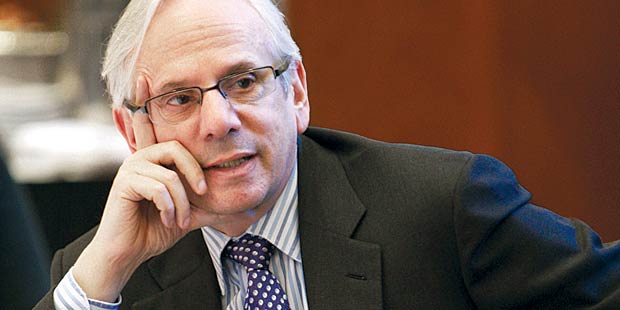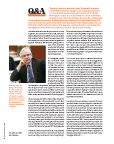Closing Statements
Printer Friendly VersionThey don’t make careers like Gerald Rosenfeld’s anymore. One of Wall Street’s top mergers-and-acquisitions advisers for more than three decades, he got his start at McKinsey, then began a long run as a dealmaker at Salomon Brothers, Bankers Trust, and Lazard Frères. He was CEO of Rothschild North America for nearly a decade before returning in 2011 as an adviser to the CEO and a vice chairman of US investment banking at Lazard Ltd. The faculty director of NYU Law’s Institute for Executive Education—which is slated to launch this fall—Rosenfeld sat down with writer Duff MacDonald to talk law and business.
Investment bankers and lawyers do a lot of work together, but they don’t really mix, do they?
Exactly. Many fresh young MBAs have never worked with a lawyer before. There’s no reason we should be keeping law and business students apart during their education. We should be getting them to learn how to work with one another before they start their jobs. That’s what we try to do in the Jacobson program.
Or, failing that, there’s still a benefit from doing so mid-career. Is that the point of the Institute for Executive Education?
Many business schools have non-degree executive education. But no law school has really attacked that market in a systematic way. With the navigation of regulation and legal frameworks becoming more and more a part of a senior manager’s job, we said to ourselves, “Why couldn’t a law school, using its knowledge and its very special set of skills, create executive education for those people?”
Is there an argument to be made that a smart law school graduate with a taste and feel for deal-making would make a better banker than most MBAs?
Over the last few years, the smart professional service firms have figured out how to better recruit at law schools. Not surprisingly, McKinsey figured it out first, then Goldman Sachs and Morgan Stanley. There’s nothing wrong with working at a law firm, but these students are equipped to do anything in the world, having gone through the rigorous education we provide them. For example, both the general counsel of McKinsey and the chief of staff to Morgan Stanley CEO James Gorman are NYU Law graduates.
Should business schools bear any responsibility for the financial crisis? Or law schools? Have we been teaching our students the wrong things?
In the 1980s and 1990s, the academic side of business seemed to have completely bought into the shareholder-centric model of the corporation espoused by many academics. We began teaching people that only value creation mattered. It all comes down to how you feel about the purpose of the corporation. Is it only to make money for shareholders? What about professional responsibilities? Then we ended up with Enron and WorldCom, and we realized that we were teaching people to be profit-seekers at the cost of everything else.
In a recent paper you co-authored about the causes of the financial crisis, you suggested a compelling reform: Shine a brighter light on complex financial structures by requiring greater disclosure, including discussions from management as to why they were used. Isn’t that heresy from a banker, to suggest reducing complexity?
When somebody tells me about a new financial product or structure and justifies it by saying that it aids liquidity and price discovery in the market, I say run the other way. Because if there’s nothing to justify it other than someone being able to scrape a few extra pennies off of a transaction in the name of liquidity, it doesn’t provide enough value to justify the added complexity. Without wading too far into what is a controversial debate, I’d suggest that there is questionable value added to the markets as a result of high-frequency trading.
Can you provide an example of a deal where lawyers and bankers worked together creatively to accomplish something?
Back in the ’80s, when I was at Salomon Brothers, we were representing General Motors as they were trying to acquire Ross Perot’s EDS. During the negotiations Perot and Roger Smith, GM’s CEO, came to us and said, “Ross wants to have some kind of public market security that will reflect the value of EDS.” At first, we said it would be impossible, because Roger wanted all of EDS. But then the bankers and lawyers got together and ended up inventing what came to be known as the tracking stock. The concept got invented to solve a particular business problem, with the intimate cooperation of lawyers and bankers, because the deal wasn’t going to happen without it.
This Q&A was edited and condensed.
—

